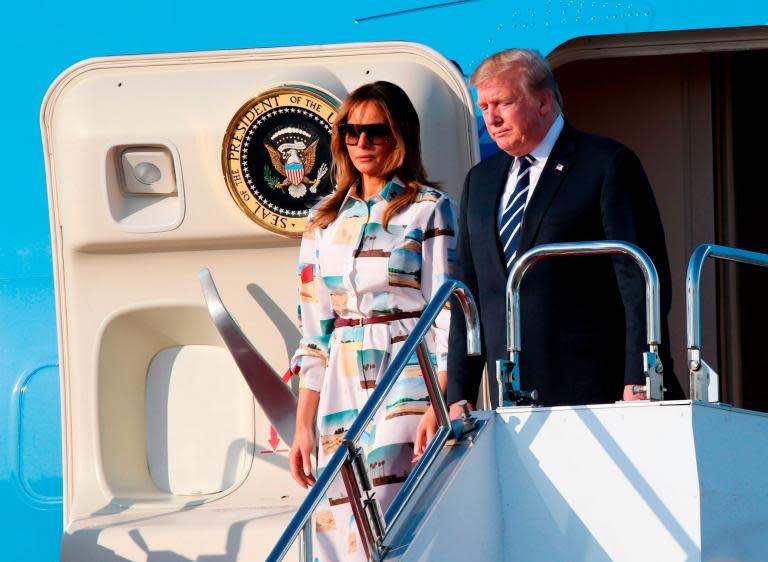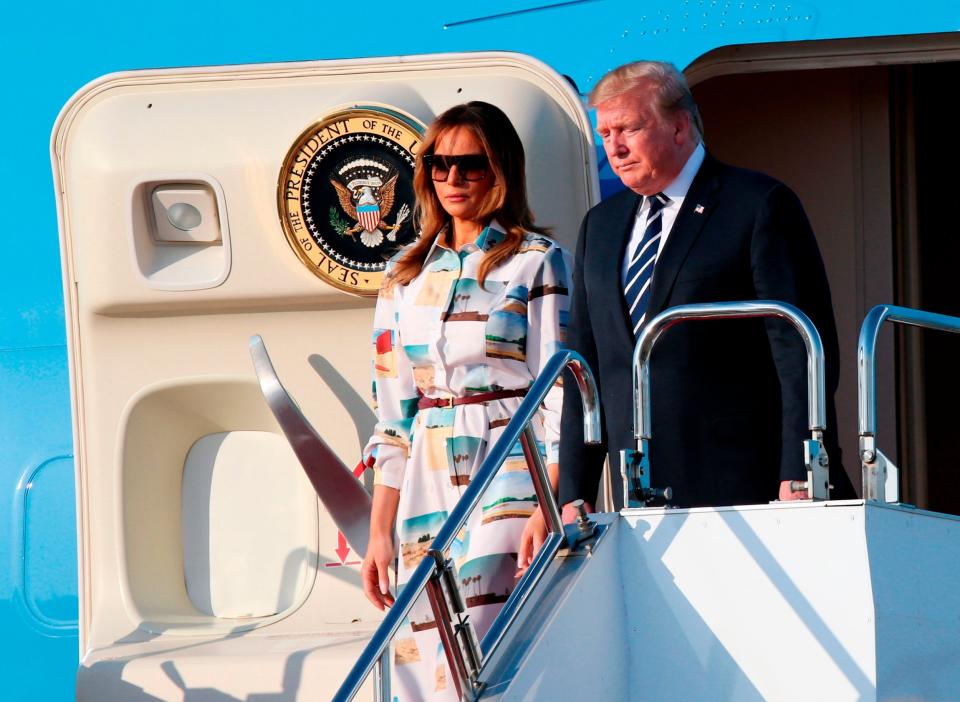Japan rolls out ‘charm offensive’ for Trump with sumo championship and golf in bid to avoid devastating tariffs
Under the threat of potentially devastating US tariffs on autos, Japan is ready to roll out the newest phase of its charm offensive targeting Donald Trump as it welcomes him on a state visit tailor-made to his whims and ego.
Offering high honours, golf and the chance to present a “Trump Cup” at a sumo wrestling championship, Japanese prime minister Shinzo Abe, arguably Mr Trump’s closest friend on the world stage, will continue a years-long campaign that so far appears to have spared Japan from far more debilitating US actions.
The stakes are high. US tariffs could cripple Japan’s auto industry, while North Korea remains a destabilising threat in the region. But this trip, the first of two Mr Trump is expected to make to Japan in the next six weeks, is more of a social call meant to highlight the alliance between the countries and the friendship between their leaders.
“In the world of Donald Trump, terrible things can happen if you’re an ally, but no major blows have landed on Japan,” said Michael Green, senior vice president for Asia and Japan chair at the Centre for Strategic and International Studies.
Mr Trump, who departed Washington for Tokyo on Friday, has the honour of being the first head of state invited to meet Emperor Naruhito since he assumed power on 1 May after his father stepped down, the first abdication in over two centuries. Mr Naruhito will welcome Mr Trump to the Imperial Palace on Monday for a meeting and banquet in his honour.
“With all the countries of the world, I’m the guest of honour at the biggest event that they’ve had in over 200 years,” Mr Trump said on Thursday.
Mr Abe will host Mr Trump on Sunday for a round of golf and take the president to a sumo wrestling match, a sport the president said he finds “fascinating.” Mr Trump is eager to present the winner with a US-made trophy.
It is all part of a kindness campaign aimed at encouraging Mr Trump to alleviate trade pressures, said Riley Walters, a policy analyst at the Heritage Foundation’s Asian Studies Centre, who said the personal relationship between Mr Trump and Mr Abe is probably the best of any two world leaders.
Mr Abe made a strategic decision before Mr Trump was elected to focus on Japan’s relationship with the US. The courtship began when Mr Abe rushed to New York two weeks after the November 2016 election to meet the president-elect at Trump Tower. Last month, Mr Abe and his wife, Akie, celebrated first lady Melania Trump’s birthday over a couples’ dinner at the White House.
Mr Trump plans to return to Japan for a summit of leading rich and developing nations in Osaka in late June.
Behind the smiles and personal friendship, however, lurks deep uneasiness over Mr Trump’s threat to impose tariffs on Japanese autos and auto parts on national security grounds, a move that would be far more devastating to the Japanese economy than earlier tariffs on steel and aluminium.
Mr Trump recently agreed to a six-month delay, enough time to carry Mr Abe past July’s Japanese parliamentary elections.
“On the surface, it’s all going to be a display of warmth, friendship, hospitality,” said Mireya Solis, a senior fellow at the Brookings Centre for East Asia Policy Studies. But, she said, “there’s an undercurrent of awkwardness and concern about what the future might hold ... We’re coming to a decisive moment. This is, I think, the moment of truth”.
Also at issue is the lingering threat of North Korea, which has resumed missile testing and recently fired a series of short-range projectiles that US officials, including Mr Trump, have tried to downplay despite an agreement by North Korea to hold off on further testing.
“The moratorium was focused, very focused, on intercontinental missile systems, the ones that threaten the United States,” secretary of state Mike Pompeo said in a recent television interview. That raised alarm bells in Japan, where short-range missiles pose a serious threat.
“That is not an acceptable American position for Japan,” said Mr Green.
Speaking to reporters on Saturday ahead of Mr Trump’s arrival, national security adviser John Bolton called the series of short-range missile tests a violation of UN Security Council resolutions and said sanctions must be kept in place.
“In terms of violating UN Security Council resolutions, there is no doubt about that,” he said, adding that Mr Trump and Mr Abe would “talk about making sure the integrity of the Security Council resolutions are maintained”.
His comments came a day after North Korean official media said nuclear negotiations with Washington will not resume unless the US abandons what Pyongyang describes as unilateral disarmament demands.
Japan, which relies on the US for its defence, has also been largely cut out of negotiations with North Korea, even as Kim Jong-un has met with other leaders in the region, including China’s Xi Jinping. That leaves Mr Abe to rely on the US as an intermediary, said Sheila Smith, an expert on Japanese politics and foreign policy at the Council on Foreign Relations.
“Abe has to rely on Trump to advocate,” she said. Mr Abe recently offered to meet Mr Kim without preconditions in an effort to restore diplomatic ties.
With Mr Trump’s relations with the leaders of the UK, Germany, Canada and other allies strained, Mr Abe has worked more than any other leader to try to keep the president engaged with international institutions, Mr Green said, adding that it is critical for Japan’s survival.
And while leaders across Europe and elsewhere might take heat for cosying up to Mr Trump, analysts say Japanese voters see him more as a curiosity and understand the pragmatic importance of good relations, which they say has paid off for Mr Abe.
Indeed, while Mr Trump has rejected Mr Abe’s invitations to rejoin a sweeping trans-Pacific trade deal and keeps the threat of tariffs in place, Mr Trump walked away from his last meeting with Mr Kim without a deal, which some had feared would include a declaration to end the Korean war and a vow to pull US troops from the peninsula.
“I would argue that Abe has been so good at maintaining the relationship that maybe things could be worse,” Mr Walters said.
Associated Press

 Yahoo News
Yahoo News 

